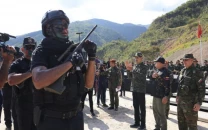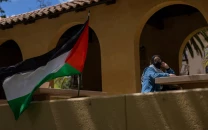Racism — an American problem
It is the responsibility of every American household to make their families consciously aware against racism

After the Ferguson incident, President Barack Obama announced an initiative on December 1 that would cost $75 million, and which would see body cameras for police officers as part of a law-enforcement monitoring programme. But the decision in the Eric Garner case two days later spoke of the fact that even events recorded on cameras — leaving no doubt of the circumstances of death and use of excessive force by law-enforcement personnel — will not be enough to change the unfair use of the law against people of colour. Another initiative is the creation of a task force that will work with civil right groups to work with law enforcement to provide necessary training to police officers. This initiative gives us a little more hope, because it may be able to help educate police officers about the history of civil rights issues in America. It might change their mindsets and open their eyes to the ideological residues of racial oppression that have led to the image of criminality attached to the African-American community.
Problems like racial profiling, the excessive use of force, and unjust killing of African-Americans by police officers, and unjust verdicts that leave many unanswered questions, is ruining the image of America as the world’s most progressive country. The image of that is being projected is of a country still living in the ugly and shameful ideologies of the past. The progress America made over a 50-year period since the civil rights movement was launched seem much smaller than we would like to think. Americans are asking the question: are we reliving an era of the new Jim Crow laws? Are these brutal killings by the police the new lynchings? Would we have seen a grand jury decision of not indicting police officer Daniel Pantaleo, if he were black and Gardner, the choked victim, white? Frank Phillips, a black police officer, was fired within 24 hours of choking Jarod Dotson, a white man. These double standards raise the critical question of unfair treatment and racism.
The world might see having a black president in office as progress in America. But is it really? In an interview with the New York Magazine, Chris Rock stated “… to say Obama is progress is saying that he’s the first black person that is qualified to be president. That’s not black progress. That’s white progress.” He raises a valid fact about America: there are a lot more white people who are conscientious about their actions than in the past and it is becoming more difficult for racist acts to permeate in society. But does that mean there has been any progress in the lives of thousands of black people? People of colour are still struggling with problems like racial profiling, inequality and racism. There is an overwhelming number of blacks in American prisons. A huge part of the African-American population is economically disenfranchised. This problem is much bigger than just a judicial system steeped in archaic ideologies. This problem stems from the long-term political, economic and social oppression of coloured people. Equal treatment with respect to law and economic opportunities is still missing.
After the Eric Garner case, President Obama addressed the crux of the issue when he said,“... right now, unfortunately, we are seeing too many instances where people just do not have confidence that folks are being treated fairly … And it is incumbent upon all of us, as Americans, regardless of race, region, faith, that we recognise this is an American problem, and not just a black problem or a brown problem or a Native American problem. This is an American problem. When anybody in this country is not being treated equally under the law, that’s a problem …”
There need to be restorative actions like civil rights education, and proper law-enforcement training. New York Mayor Bill de Blasio’s recent announcement of a three-day retraining of the police force holds promise. But will a three-day training which may include a lecture on self-regulating emotions, smart policing techniques and better use of physical tactics be enough? For long-lasting results, it is imperative that the police academies make education on civil rights, awareness against racial profiling, and history of race relations a major part of their curriculum. Without a complete understanding of African-American history, negative stereotypes and attitudes will continue to infest American society.
This is not a black or white responsibility. It is the responsibility of every American household to make their families consciously aware against racism. America has to face and fix the humanitarian issues at home first if it expects respect as a voice of authority on global humanitarian issues. The world is watching.
Published in The Express Tribune, December 14th, 2014.
Like Opinion & Editorial on Facebook, follow @ETOpEd on Twitter to receive all updates on all our daily pieces.



1726734110-0/BeFunky-collage-(10)1726734110-0-208x130.webp)















COMMENTS
Comments are moderated and generally will be posted if they are on-topic and not abusive.
For more information, please see our Comments FAQ